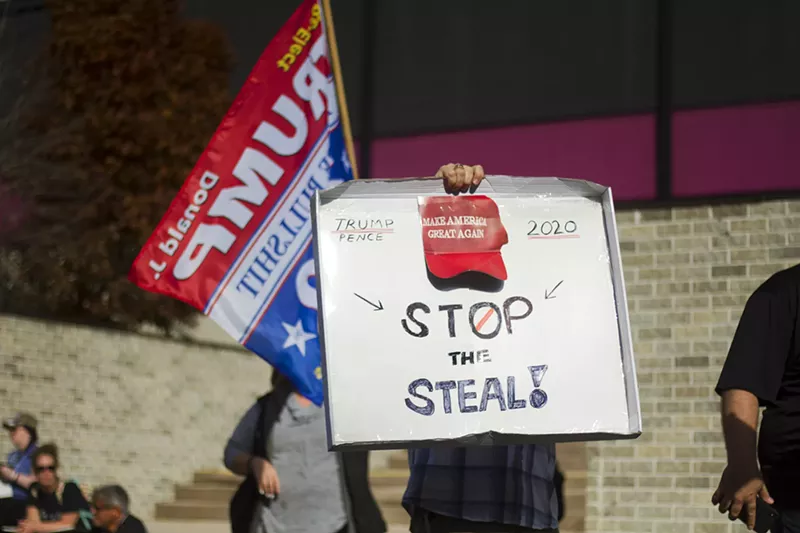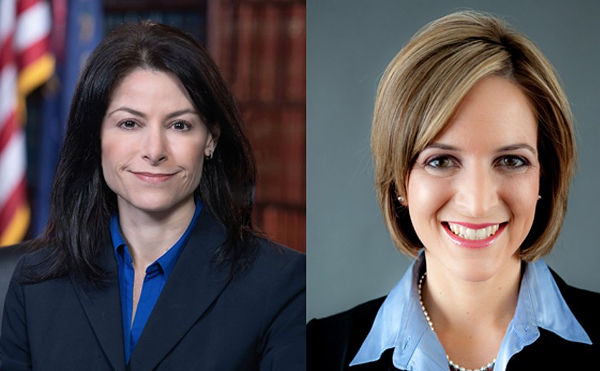Election deniers pose a significant threat to Michigan’s presidential election, watchdog group warns
Bad-faith county clerks and boards of canvassers members could disrupt the upcoming election

Audio By Carbonatix
[
{
"name": "GPT - Leaderboard - Inline - Content",
"component": "35519556",
"insertPoint": "5th",
"startingPoint": "3",
"requiredCountToDisplay": "3",
"maxInsertions": 100,
"adList": [
{
"adPreset": "LeaderboardInline"
}
]
}
]

A nonprofit watchdog group is raising alarms about the potential for election deniers to disrupt Michigan’s upcoming presidential election, warning that some local officials may try to subvert election processes and perpetuate false narratives about voter fraud.
Informing Democracy published a report Friday that highlights concerns that election deniers, including county clerks and members of county boards of canvassers, could undermine Michigan’s strong election laws by acting in bad faith.
“Because Michigan election law itself is strong, many of the election vulnerabilities in Michigan are created and sustained by bad faith actors violating settled law,” the report states. “After 2020, Michigan remains a target for those seeking to perpetuate election conspiracies, and as a result, the state’s elections remain vulnerable to the threats posed by such conspiracies.”
The report uncovered troubling trends about the actions and statements of some county clerks and members of the state’s 407 boards of canvassers. Of the officials reviewed, 51 — more than 12% — were flagged for raising concerns, either through promoting election conspiracies, denying the results of the 2020 election, or showing a willingness to subvert the administration of an election.
Wayne and Macomb counties were identified as having unsettling vulnerabilities. Members of the Wayne County Board of Canvassers include Robert Boyd, who previously said he would not have certified the 2020 election, and Katherine Riley, who led election denial training sessions.
In Macomb County, Clerk Anthony Forlini pursued a forensic audit of the 2020 election, which was embraced by election conspiracy theorists. He also hired an election denier who attended the Jan. 6th riot to train poll workers.
In all, 13 counties were identified as having officials with concerning records, raising fears about potential disruption during the vote certification process. In Wayne, Alcona, and Macomb counties, members of the Boards of Canvassers have publicly shared election conspiracy theories, creating doubts about whether these officials will follow the law when certifying future elections.
The report also noted the possibility of deadlocked votes on certification in several counties where more than one member of the board of canvassers holds views denying the legitimacy of past election results.
Beyond election officials of concern, the report highlighted a coordinated movement of election-denying groups that are targeting the state and working to discredit the election system through recounts and audits. Several election officials, including Riley, have ties to these groups.
In some cases, officials who embraced conspiracy theories have also shown support for extremist movements. Calhoun County Board of Canvassers member Ginger Kamps shared content related to the Three Percenters, a far-right anti-government group, while others expressed support for efforts to overturn the results of the 2020 election.
Michigan’s decentralized election system, which is spread across 1,603 county and local offices, offers some safeguards, but Informing Democracy warns that this structure also creates multiple points of vulnerability for bad actors to exploit. This decentralization, combined with organized efforts from election deniers, could present serious challenges in administering free and fair elections in the state, according to the report.
Of particular concern is the potential for split votes on certification and delays resulting from recounts or other legal challenges.
The report also cautions about the possibility of threats to election workers.
“In Michigan, threats against election workers and officials are real and remain a top concern,” the report states.
Informing Democracy emphasized the need for ongoing vigilance to protect the election system.






